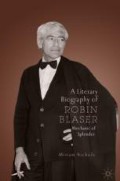Abstract
Established in Vancouver by the mid-1970s, Blaser had become the “cher maître” for his friends and students at SFU. During this period, he met his life partner, David Farwell, and settled down with him. Much of his energy then went into his work. He embraced Canadian poetry with editions of poems by George Bowering and Louis Dudek, and produced some of his most scholarly work, notably “The Violets” on Olson and Alfred North Whitehead and “‘My Vocabulary Did This To Me,’” for the Spicer White Rabbit Symposium in 1986. His serial poem, Syntax, is dedicated to Farwell. This chapter follows Blaser through these projects and the “Turner Tour,” a trip through American art galleries financed by an antique shop find of a small J.M.W. Turner painting.
Access this chapter
Tax calculation will be finalised at checkout
Purchases are for personal use only
Notes
- 1.
Wheeler’s notes, dated 3 February 1976, sketch a film called “Death-Work,” that is to include the sessions with Blaser.
- 2.
In “out of the velvet,” a piece Blaser wrote for Charles Bernstein’s special edition of boundary 2, 99 Poets/1999: An International Poetics Symposium, he is explicit on the subject of nationalism:
I do not see my work in the context of a national state, though I hold, with conscience, dual citizenship by birth in the United States and by responsibility to Canada, where I have lived and earned my living during the last thirty-two years. Oh, yes, I worry about nationalisms, their mythic destinies borrowed from religion, and the endangered democracies here and abroad. (Fire, 96)
This brief essay postdates the period under discussion in this chapter, but it expresses a long-held view.
- 3.
This reading was held as one of a series in an SFU summer event called The Coast is Only a Line, featuring credit courses and a reading series. SFU faculty Roy Miki and Kathy Mezei were festival organizers. At the Blaser reading, 14 August 1981, Miki introduced George Bowering who introduced Blaser. “Cher maître” is Bowering’s phrase (Bowering 1981, “Introduction to Blaser reading”).
- 4.
For a nuanced description of nationalist and anti-nationalist arguments in Canadian literary circles at mid-century and the source of them in Canada’s branch plant economy (65% of Canada’s economy was foreign owned in 1958 (Dart 7)) see Ron Dart’s Robin Mathews: Crown Prince of Canadian Political Poets (7–8). Mathews was a more radical champion of CanLit than Margaret Atwood (Survival) or Northrop Frye (The Bush Garden ), these latter often taken as the standard bearers of Canadian literature in universities. Mathews was particularly outraged by Tallman and TISH, American imports from his perspective, to the point of initiating a protest against George Bowering’s Governor General’s Award in 1970.
- 5.
Andreas Huyssen challenged the narrative of rupture between the modern, postmodern, and avant garde in his After the Great Divide of 1986. My phrasing plays on Huyssen’s book title. Huyssen argues that American postmodernism offers formal experimentation disconnected from the aim of the social justice he connects with an older European avant garde (170), but he also questions the possibility of retying art to a progressive real-world agenda when cultures everywhere have become heterogeneous (175–76). More bluntly said, the modernist Habermasian argument for the continuation of the enlightenment project runs aground on postmodern conditions such as globalized economics, social heterogeneity, and the balkanizing effect of identity politics.
- 6.
Grahn and Winkler were not at New College at the same time as was Blaser, but Blaser did receive (and save) copies of their lectures.
- 7.
The KSW website has changed since I took this list of panels from it. However, kswnet.org offers a link to “Poetics Statements” given at the New Poetics Colloquium.
- 8.
The postcard from Opal Whiteley to Sophia Nichols Auer is in MsA1a Box 9, Folder 1, Blaser fonds. It is brief and now illegible because the ink has faded.
- 9.
In Writing Degree Zero, Barthes says, “we know, for example, that the content of the word ‘Order’ always indicates repression” (26). The context of this remark is a discussion of “police-state writing,” but there is no sure way to separate one mode of language use from another under the vigilance of a self-reflexive practice. Barthes himself writes of this very eloquently later in the book: “There is therefore in every present mode of writing a double postulation: there is the impetus of a break and the impetus of a coming to power, there is the very shape of every revolutionary situation, the fundamental ambiguity of which is that Revolution must of necessity borrow, from what it wants to destroy…” (Barthes [1968] 1980, 87).
Author information
Authors and Affiliations
Rights and permissions
Copyright information
© 2019 The Author(s)
About this chapter
Cite this chapter
Nichols, M. (2019). Cher Maître. In: A Literary Biography of Robin Blaser. Modern and Contemporary Poetry and Poetics. Palgrave Macmillan, Cham. https://doi.org/10.1007/978-3-030-18327-1_7
Download citation
DOI: https://doi.org/10.1007/978-3-030-18327-1_7
Published:
Publisher Name: Palgrave Macmillan, Cham
Print ISBN: 978-3-030-18326-4
Online ISBN: 978-3-030-18327-1
eBook Packages: Literature, Cultural and Media StudiesLiterature, Cultural and Media Studies (R0)

